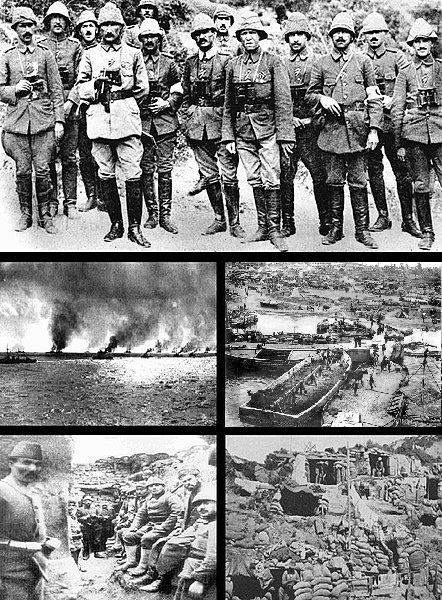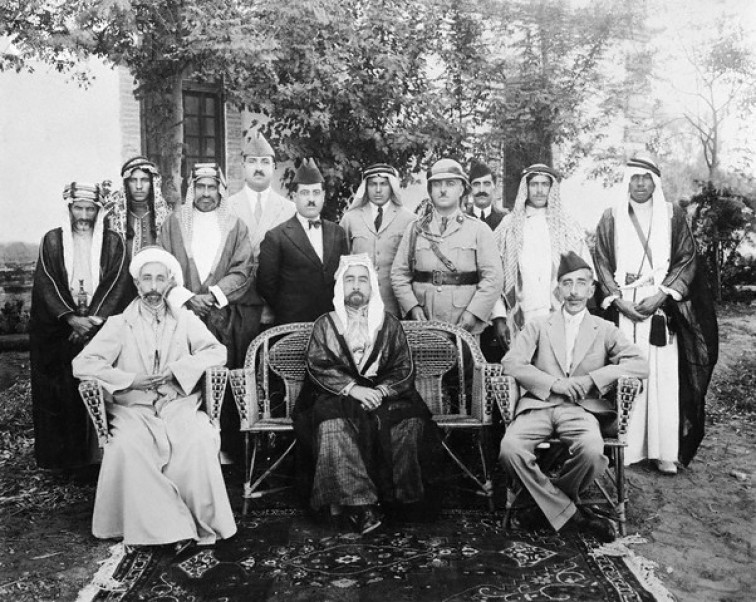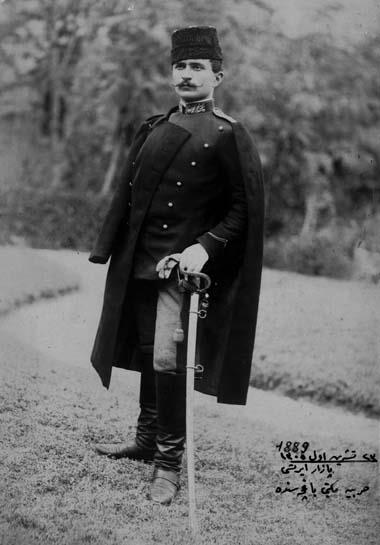|
Arab Revolt (other)
The Arab Revolt ( ar, الثورة العربية ), also known as the Great Arab Revolt ( ), was an armed uprising by the Hashemite-led Arabs of the Hejaz against the Ottoman Empire amidst the Middle Eastern theatre of World War I. On the basis of the McMahon–Hussein Correspondence, exchanged between Henry McMahon of the United Kingdom and Hussein bin Ali of the Kingdom of Hejaz, the rebellion against the ruling Turks was officially initiated at Mecca on 10 June 1916. The primary goal of the Arab rebels was to establish an independent and unified Arab state stretching from Aleppo to Aden, which the British government had promised to recognize. The Sharifian Army, led by Hussein and the Hashemites with backing from the British military's Egyptian Expeditionary Force, successfully fought and expelled the Ottoman military presence from much of the Hejaz and Transjordan. By 1918, the rebels had captured Damascus and proclaimed the Arab Kingdom of Syria, a short-lived ... [...More Info...] [...Related Items...] OR: [Wikipedia] [Google] [Baidu] |
Middle Eastern Theatre Of World War I
The Middle Eastern theatre of World War I saw action between 29 October 1914 and 30 October 1918. The combatants were, on one side, the Ottoman Empire (including the majority of Kurdish tribes, a relative majority of Arabs, and Caucasian ''Tatars''), with some assistance from the other Central Powers; and on the other side, the British (with the help of Jews, Greeks, Assyrians, some Kurdish tribes, and many Arabs, along with Hindu and Muslim colonial troops from India), the Russians (with the help of Armenians, Assyrians, and occasionally some Kurdish tribes) and the French (with its North African and West African Muslim colonial troops) from among the Allied Powers. There were five main campaigns: the Sinai and Palestine Campaign, the Mesopotamian Campaign, the Caucasus Campaign, the Persian Campaign, and the Gallipoli Campaign. There were also several minor campaigns: Arab Campaign, and South Arabia Campaign. Both sides used local asymmetrical forces in t ... [...More Info...] [...Related Items...] OR: [Wikipedia] [Google] [Baidu] |
Auda Abu Tayi
Auda Abu Tayeh or Awda Abu Tayih ( ar, عودة أبو تايه 11 January 1874 – 27 December 1924) was the leader ( shaikh) of a section of the Howeitat or Huwaytat tribe of Bedouin Arabs at the time of the Great Arab Revolt during the First World War. The Howeitat lived in what is now Saudi Arabia/ Jordan. Auda was a significant figure in the Arab Revolt; outside Arabia he is mainly known through his portrayal in British Col. T. E. Lawrence's account '' Seven Pillars of Wisdom'', and from the partly fictionalised depiction of him in David Lean's film '' Lawrence of Arabia''. The Howeitat Lawrence recorded that the Jazi Howeitat had formerly been under the leadership of the House of Rashid, the amirs of Ha'il, but had since fragmented and that Auda had come to control the Eastern Howeitat, known as the abu Tayi.Lawrence, T. E. The Howeitat and their Chiefs'', ''Arab Bulletin'' report of 24 July 1917, from telawrence.net Auda had taken up the claims of his father, H ... [...More Info...] [...Related Items...] OR: [Wikipedia] [Google] [Baidu] |
McMahon–Hussein Correspondence
The McMahon–Hussein Correspondence is a series of letters that were exchanged during World War I in which the Government of the United Kingdom agreed to recognize Arab independence in a large region after the war in exchange for the Sharif of Mecca launching the Arab Revolt against the Ottoman Empire. The correspondence had a significant influence on Middle Eastern history during and after the war; a dispute over Palestine continued thereafter. The correspondence is composed of ten letters that were exchanged from July 1915 to March 1916 between Hussein bin Ali, Sharif of Mecca and Lieutenant Colonel Sir Henry McMahon, British High Commissioner to Egypt. Whilst there was some military value in the Arab manpower and local knowledge alongside the British Army, the primary reason for the arrangement was to counteract the Ottoman declaration of ''jihad'' ("holy war") against the Allies, and to maintain the support of the 70 million Muslims in British India (particularly thos ... [...More Info...] [...Related Items...] OR: [Wikipedia] [Google] [Baidu] |
Ottoman Empire
The Ottoman Empire, * ; is an archaic version. The definite article forms and were synonymous * and el, Оθωμανική Αυτοκρατορία, Othōmanikē Avtokratoria, label=none * info page on book at Martin Luther University) // CITED: p. 36 (PDF p. 38/338) also known as the Turkish Empire, was an empire that controlled much of Southeast Europe, Western Asia, and North Africa, Northern Africa between the 14th and early 20th centuries. It was founded at the end of the 13th century in northwestern Anatolia in the town of Söğüt (modern-day Bilecik Province) by the Turkoman (ethnonym), Turkoman tribal leader Osman I. After 1354, the Ottomans crossed into Europe and, with the Ottoman wars in Europe, conquest of the Balkans, the Ottoman Anatolian beyliks, beylik was transformed into a transcontinental empire. The Ottomans ended the Byzantine Empire with the Fall of Constantinople, conquest of Constantinople in 1453 by Mehmed the Conqueror. Under the reign of Sule ... [...More Info...] [...Related Items...] OR: [Wikipedia] [Google] [Baidu] |
Hashemites
The Hashemites ( ar, الهاشميون, al-Hāshimīyūn), also House of Hashim, are the royal family of Jordan, which they have ruled since 1921, and were the royal family of the kingdoms of Hejaz (1916–1925), Syria (1920), and Iraq (1921–1958). The family had ruled the city of Mecca continuously from the 10th century, frequently as vassals of outside powers, and were given the thrones of the Hejaz, Syria, Iraq, and Jordan following their World War I alliance with the British Empire; this arrangement became known as the " Sharifian solution". The family belongs to the Dhawu Awn, one of the branches of the Ḥasanid Sharifs of Mecca, also referred to as Hashemites. Their eponymous ancestor is traditionally considered to be Hashim ibn Abd Manaf, great-grandfather of the Islamic prophet Muhammad. The Ḥasanid Sharifs of Mecca (from whom the Hashemite royal family is directly descended), including the Hashemites' ancestor Qatadah ibn Idris, were Zaydī Shīʿas unt ... [...More Info...] [...Related Items...] OR: [Wikipedia] [Google] [Baidu] |
Siege Of Medina
Medina, an Islamic holy city in Arabia, underwent the longest siege during World War I. Medina was at the time part of the Ottoman Empire. In the war, the Ottoman Empire sided with the Central Powers. Sharif Hussain of Mecca revolted against the caliph and the Ottoman Empire which, under the leadership of the nationalistic Young Turks, had ignored the wishes of the Caliph and sided with the Central Powers. Sharif Hussain instead sided with the British Empire. T. E. Lawrence was instrumental in this revolt. Hussain occupied Mecca and besieged Medina. It was one of the longest sieges in history that lasted until even after the armistice (10 January 1919). Fahreddin Pasha was the defender of Medina. Most celebrated him as "''the Lion of the Desert''" for his bravery and perseverance in the face of intense pressure and hardship, despite the suffering of those who remained in Medina. The siege lasted two years and seven months. Background In June 1916 Sharif Hussain, the Ha ... [...More Info...] [...Related Items...] OR: [Wikipedia] [Google] [Baidu] |
Routledge
Routledge () is a British multinational publisher. It was founded in 1836 by George Routledge, and specialises in providing academic books, journals and online resources in the fields of the humanities, behavioural science, education, law, and social science. The company publishes approximately 1,800 journals and 5,000 new books each year and their backlist encompasses over 70,000 titles. Routledge is claimed to be the largest global academic publisher within humanities and social sciences. In 1998, Routledge became a subdivision and imprint of its former rival, Taylor & Francis Group (T&F), as a result of a £90-million acquisition deal from Cinven, a venture capital group which had purchased it two years previously for £25 million. Following the merger of Informa and T&F in 2004, Routledge became a publishing unit and major imprint within the Informa "academic publishing" division. Routledge is headquartered in the main T&F office in Milton Park, Abingdon, Oxfordshir ... [...More Info...] [...Related Items...] OR: [Wikipedia] [Google] [Baidu] |
Saud Bin Abdulaziz Al Rashid
Saud bin Abdulaziz Al Rashid ( ar, سعود بن عبدالعزيز الرشيد, Suʿūd ibn ʿAbdulʿazīz Āl Rašid; 1898 – 1920) was the tenth Emir of Jabal Shammar between 1908 and 1920. Biography It is likely that he was born in 1898 , in Hail , and he was eight years old when his father was killed, and barely a year had passed since his father’s death, until his older brothers ( Muteib the governor of Hail at the time, and Muhammad and Mishal) were killed by their uncle Sultan Al-Hamoud Al-Rashid , while he survived from The massacre when his uncles al-Sabhan fled to Medina , and lived there until the people of Hail sent to Hammoud al-Sabhan in 1908 asking to return with Prince Saud to take the leadership, knowing that Prince Saud could not assume the reins of government according to the customary constitution in Hail’s rule, Sfter the situation under the rule of Prince Saud Al-Hamoud Al-Rashid. Saud arrived in Hail in 1908 at the age of thirteen years, and the w ... [...More Info...] [...Related Items...] OR: [Wikipedia] [Google] [Baidu] |
Recep Peker
Mehmet Recep Peker (5 February 1889 – 1 April 1950) was a Turkish military officer and politician. He served in various ministerial posts and finally as the Prime Minister of Turkey. He self-identified as a FascistÖzkaya, Ahmet. ''Recep Peker'in Kişiliği ve İdeolojilere Bakışı'' and was critical of Islam. Early life Born in Istanbul on 5 February 1889, his father was named Mustafa and was of Lezgi descent, migrated to Anatolia from the Dagestan region of the Caucasus. He studied at the Military College following his graduation from the Kuleli Military High School, where he enrolled after completing his primary and secondary education at Koca Mustafa Pasha Primary School and Military Middle School. After finishing the academy in the rank of a lieutenant in 1907, he was assigned to the staff officer class. Recep Peker took part at the battles of Yemen and Libya, Balkan Wars, Thrace and Caucasus campaigns of the World War I. He graduated in 1919, as the first of his c ... [...More Info...] [...Related Items...] OR: [Wikipedia] [Google] [Baidu] |
Muhittin Akyüz
Muhittin Akyüz (1870 – 11 November 1940), known as Muhiddin Pasha until 1934, was a Turkish military officer and diplomat. He served for both the Ottoman Army and the Turkish Army. Medals and decorations *War Medal *Silver Medal of Liyaqat *Silver Medal of Imtiyaz * Medal of Independence with Red Ribbon See also *List of high-ranking commanders of the Turkish War of Independence This list includes high-ranking commanders who took part in the Turkish War of Independence: See also * Turkish State Cemetery#Burials * List of recipients of the Medal of Independence with Red-Green Ribbon (Turkey) Footnotes References ... Sources External links * Bilal N. Şimşir"Cumhuriyetin İlk Çeyrek Yüzyılında Türk Diplomatik Temsilcilikleri ve Temsilcileri (1920-1950)" ''Atatürk Araştırma Merkezi Dergisi'', Sayı 64-65-66, Cilt: XXII, Mart-Temmuz-Kasım 2006. {{DEFAULTSORT:Akyuz, Muhittin 1870 births 1940 deaths Military personnel from Istanbul Ottoman Mili ... [...More Info...] [...Related Items...] OR: [Wikipedia] [Google] [Baidu] |
Fakhri Pasha
Ömer Fahrettin Türkkan, commonly known as Fahreddin Pasha and nicknamed the Defender of Medina, was a Turkish career officer, who was the commander of the Ottoman Army and governor of Medina from 1916 to 1919. He was nicknamed "''The Lion of the Desert''" and "''The Tiger of the Desert''"S. Tanvir Wasti ''The defence of Medina, 1916–19'' Middle Eastern Studies Vol. 27, No. 4 (Oct., 1991), Published by: Taylor & Francis, Ltd. pp. 642-653 by the British and Arabs for his patriotism in Medina''Defence Of Medina'' , İsmail Bilgin, , Timas Publishing Group. and is known for defending Medina in the during World War I.< ... [...More Info...] [...Related Items...] OR: [Wikipedia] [Google] [Baidu] |
Djemal Pasha
Ahmed Djemal ( ota, احمد جمال پاشا, Ahmet Cemâl Paşa; 6 May 1872 – 21 July 1922), also known as Cemal Pasha, was an Ottoman military leader and one of the Three Pashas that ruled the Ottoman Empire during World War I. Djemal was born in Mytilene, Lesbos. As an officer of II Corps he was stationed in Salonica where he developed political sympathies for the Committee of Union and Progress (CUP) reformers. He was initially praised by Christian missionaries and provided support to the Armenian victims of the Adana massacres. In the course of his army career Djemal developed a rivalry with Mustafa Kemal Atatürk, served in Salonica on the frontlines of the Balkan Wars and was given the military command of Constantinople after the Raid on the Sublime Porte. Djemal's authoritarian three year rule in Syria alienated the local population who opposed Turkish nationalism. Djemal Pasha's role in the Armenian genocide has been controversial as his policies were not as d ... [...More Info...] [...Related Items...] OR: [Wikipedia] [Google] [Baidu] |







